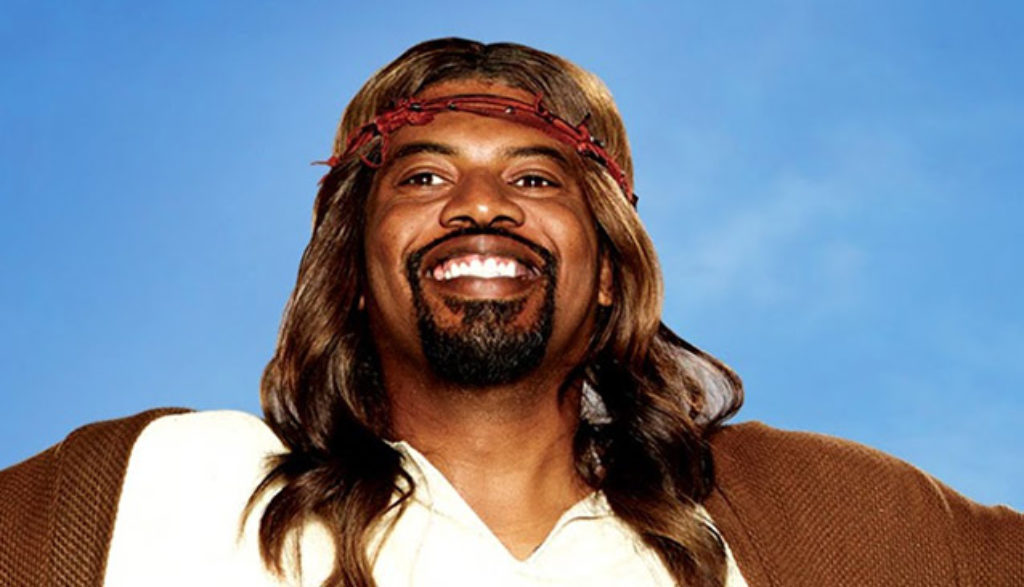
The Night Agent
As far as spy thrillers go, The Night Agent is par for the course. But as far as family viewing goes, it might be better to blacklist this one.

Jesus hung out with sinners all the time. But He never sinned. Cartoon Network’s Black Jesus, on the other hand, hangs out with sinners and sins with them.
And that’s a problem.
The premise of Black Jesus, which is scheduled during the channel’s late night Adult Swim block of programming, is as follows: Jesus (or a man who thinks he’s Jesus) once again walks among us—only this time in Compton instead of Jerusalem. And his first goodwill mission is to help his tiny band of fledgling disciples build a community garden.
A community garden devoted to growing marijuana.
Everyone knew that Black Jesus was going to be controversial. And creators Aaron McGruder (of The Boondocks fame) and Mike Clattenburg obviously designed it to be so. McGruder has long been a cultural provocateur, and nothing gins up publicity like religious controversy. And, indeed, a number of religious organizations have reliably scourged the show.
“If it’s possible for a cable television to set a new record in deplorability, Black Jesus did just that,” said Tim Wildmon, president of the American Family Association. One Million Moms fired off a press release before the first episode aired, calling it “blasphemy” and hoping to keep the series from ever finding its way into homes.
That tactic didn’t work, of course, and the show has now become a ratings winner—consistently logging in as one of the most-watched cable shows on Thursday nights. (Its premiere drew more than 2 million viewers.) The outrage seems to have settled into a long simmer as episodes come and go, and more than a few TV critics say that Black Jesus is just all right with them.
James Poniewozik of Time wrote, “You might expect McGruder, given his Boondocks history, to be out for pointed religious satire, but Black Jesus is really more of a stoner hangout comedy with a heart.” Soraya Nadia McDonald of The Washington Post said, “If anything, it seems McGruder is trying to tell his audience that if Jesus is just like us, maybe it’s not so much of a stretch for us to be just like him.” Even the Catholic League—no stranger to cultural outrage—revealed that the Jesus in Black Jesus is “irreverent, and can be downright crude, but he also has many redeeming qualities.”
Black Jesus’ decidedly unsanctified titular protagonist is indeed a caring, forgiving guy—a man with some pithy things to say about unconditional love and our sometimes topsy-turvy sense of priorities. He gently scolds those around him for being selfish and vain. He clearly cherishes everyone he meets.
A quick example: When he wakes up a drunk named Lloyd, the homeless guy says, “Jesus, you smell like s—.” Then Lloyd pauses and says, “Maybe that’s me.” And he passes out again. Jesus’ response? “I love you so much, Lloyd,” he says with both sincerity and weary exasperation—which is kind of the way I picture the real Jesus talking to us in our not-so-great moments.
But here’s the thing. Jesus probably really did smell bad at the time … because he had just gotten back from a profanity-riddled escapade to steal horse dung for the community pot garden.
And so we come back to the comedy’s theological calamity. With all due respect to McDonald, Jesus is not like us. He was both fully human and fully divine—paradoxically God in human form. He lived among us to cleanse our sins—not to excuse them and certainly not to help us commit them.
I can see why McGruder errs on the human side of the human/divine equation, though. Most of us tend to err in that same way these days. In our effort to wrap our minds around the fact that our Lord and Savior Jesus Christ was fully human, we can lose sight of what it simultaneously means for him to be fully divine. We remember how much He loves us but soft pedal the rest of His nature. He was a perfect soul encased in an imperfect body—light years from the Black Jesus we see on Cartoon Network.
The show has scads of other issues (as perhaps you’ve surmised). The language is more than earthy, it’s downright filthy (and, on iTunes, completely uncensored). Allusions to sex are frequent. Drug use is common.
But it’s the fact that Jesus himself engages in so many of these problematic elements that makes Black Jesus such a sad and perhaps damaging half-hour comedy. To showcase very imperfect people, that’s one thing (and in terms of content, certainly problematic enough). To showcase a very imperfect Jesus, well, that is blasphemous. There’s just no other word for it.
“The S*** Heist”
Jesus’ garden is ready to plant, but lacks fertilizer. Manure costs $800 a ton, which Jesus and his followers are not inclined to pay. (Jesus thinks that manure, which everyone calls “s—,” should be free.) So they plot to break into a farm, shovel some into a pickup and drive away. Meanwhile, Vic wonders whether someone has stolen his expensive loafers, and he bribes homeless Lloyd to break into Fish’s apartment and look for them.
Jesus takes Vic to task for being so obsessed with his shoes, reminding him that vanity is one of the seven deadly sins. Another lesson in humility comes when somebody else’s retro Air Jordans get besmirched with fertilizer. Then it’s on to the ideal of forgiveness when Jesus finds Lloyd passed out almost naked in Fish’s apartment.
But Jesus swears, misleads, and then breaks into the farm right along with is homies. We see passionate kissing. Lloyd guzzles beer and steals food. Others drink wine. F-words and s-words tally in at a dozen each. “N-gger” pops up a few more times than that, and we also hear “a–,” “b–ch” and “h—.” God’s name is misused a few times, once with “d–n.” And one could easily be argued that Jesus’ name and person are abused throughout.


Paul Asay has been part of the Plugged In staff since 2007, watching and reviewing roughly 15 quintillion movies and television shows. He’s written for a number of other publications, too, including Time, The Washington Post and Christianity Today. The author of several books, Paul loves to find spirituality in unexpected places, including popular entertainment, and he loves all things superhero. His vices include James Bond films, Mountain Dew and terrible B-grade movies. He’s married, has two children and a neurotic dog, runs marathons on occasion and hopes to someday own his own tuxedo. Feel free to follow him on Twitter @AsayPaul.

As far as spy thrillers go, The Night Agent is par for the course. But as far as family viewing goes, it might be better to blacklist this one.

This math-centric thriller comes with an interesting premise. But Prime Target comes with some primary problems, too.

In Netflix’s new anime series Babanba Banban Vampire, a 450-year-old vampire longs for the untainted blood of a 15-year-old boy.

Severance takes us on an unsettling ride—one with few thrilling loops and dips, but strange turns that may still make you a little queasy.
Our weekly newsletter will keep you in the loop on the biggest things happening in entertainment and technology. Sign up today, and we’ll send you a chapter from the new Plugged In book, Becoming a Screen-Savvy Family, that focuses on how to implement a “screentime reset” in your family!